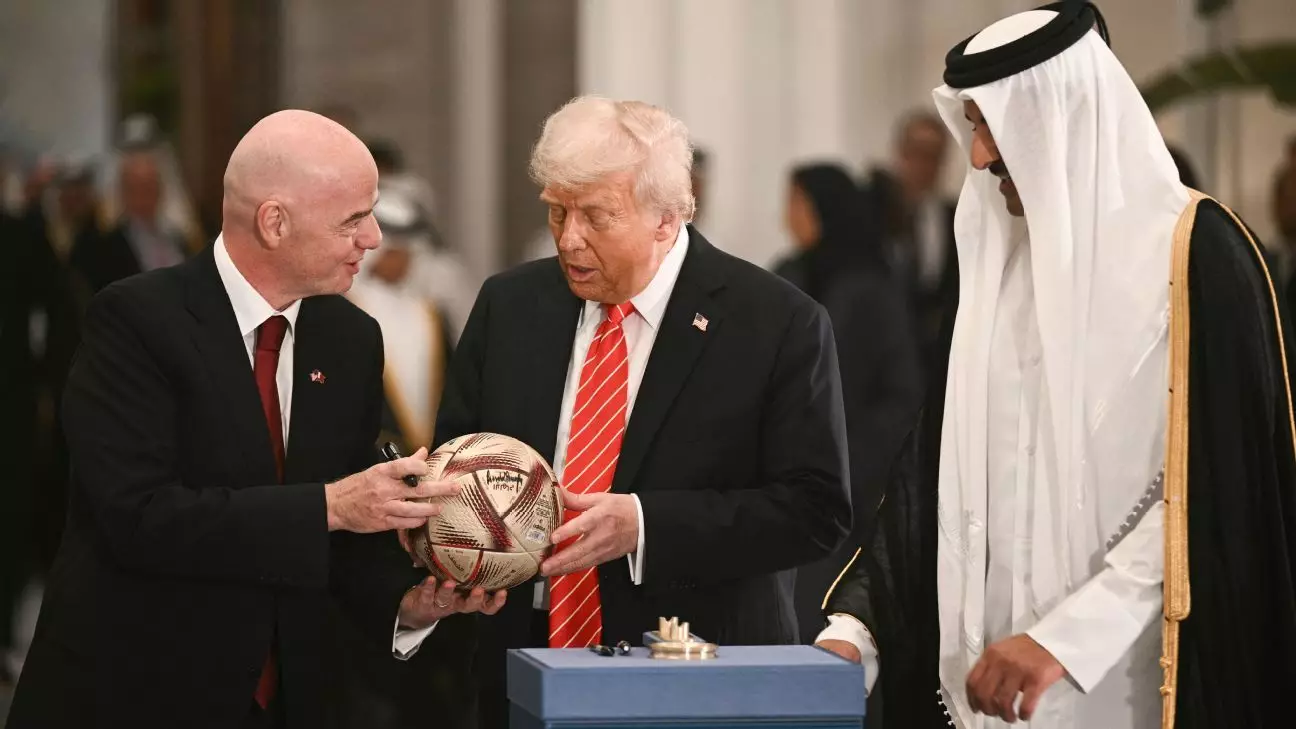In an era where promptness is a cornerstone of professionalism, FIFA President Gianni Infantino’s late arrival to the organization’s annual meeting in Asuncion, Paraguay, has raised eyebrows and ignited discussions long after the event’s conclusion. Infantino, traveling from the Middle East after accompanying U.S. President Donald Trump on state visits to Saudi Arabia and Qatar, arrived more than three hours late. The implications of his tardiness are not merely logistical; they signal deeper issues within the leadership of one of the most prominent football organizations in the world.
The delay did not simply disrupt the schedule of the meeting attended by 211 member federations; it exposed the divided priorities within FIFA. The meeting was a crucial assembly before the 2026 FIFA World Cup, making it imperative for all members to engage fully and earnestly. Instead, Infantino’s late entry raised questions about his commitment to the organization he leads. Football is not merely a sport; for many, it encapsulates passion, community, and hope. Yet, Infantino’s actions suggest a troubling tendency to prioritize political exhibitions over the organization’s foundational purpose.
Political Expediency or Genuine Representation?
In justifying his absence and subsequent delay, Infantino expressed his belief that attending political events in the Middle East was paramount for representing football on a global stage. His comments reflect a growing trend where the line between sports administration and political maneuvering is becoming increasingly blurred. While fostering relationships with political leaders can bolster FIFA’s global standing, one must question whether such actions genuinely serve the interests of football or merely benefit Infantino’s personal agenda.
The optics of Infantino’s preference for mingling with political elites rather than attending to the needs of national federations suggest a concerning transformation of the FIFA presidency. Infantino’s repeated apologies at the meeting—citing flight issues—offered little reassurance to the delegates who had anticipated an earnest and engaged discussion about the future of football. Instead, they were left waiting and speculating about the seriousness of the organization’s leadership.
A Disappointing Turnout
As a direct consequence of Infantino’s delay, the meeting witnessed an early exodus of notable European officials, including UEFA president Aleksander Ceferin. Whether their departure was merely due to earlier travel plans or a silent protest against Infantino’s apparent disregard for the proceedings is immaterial; the result was a stark display of disunity at a pivotal moment. The absence of key figures could be interpreted as symptomatic of a broader rift within FIFA, highlighting discontent with the current leadership style.
Adding to the meeting’s tumult, many delegates didn’t return after a scheduled coffee break, illustrating an alarming lack of engagement that had been anticipated among representatives from various countries. The empty seats on stage, especially those reserved for UEFA officials, painted an uncomfortable picture for Infantino. It was clear that the unsettling atmosphere reflected a growing dissatisfaction among member federations regarding their president’s priorities.
FIFA’s Future and the Global Stage
Indeed, as major footballing events loom on the horizon, including the 2026 World Cup, the need for qualified and decisive leadership has never been more critical. Infantino’s priorities, seemingly directed toward personal leveraging on a global political platform, raise serious concerns about his ability to effectively lead FIFA into this new era. His connections with Trump and the Middle Eastern leaders do offer potential advantages, but at what cost to the integrity of the sport and the essential democratic nature of the organizations he oversees?
The future of FIFA depends on maintaining a careful balance between engaging with political leaders and remaining accountable to the footballing community. As countries prepare to co-host the 2030 World Cup, it is imperative that FIFA’s leadership reflects a commitment to football first, politics second. Only through a renewed focus on the grassroots and the aspirations of its member federations can FIFA hope to safeguard its cherished values, ensuring that the beautiful game remains untarnished by unnecessary political entanglements.

